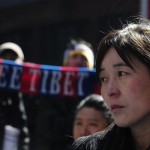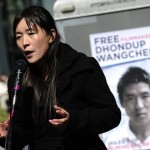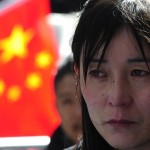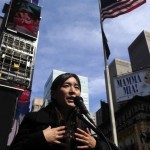Lhamo Tso demands release of her husband Dhondup Wangchen
(AFP, New York) The wife of detained Tibetan documentary maker Dhondup Wangchen broke down in tears Friday in New York as she blamed Chinese rule for a wave of self-immolations by protesters in her homeland.
Lhamo Tso, a petite woman who last spoke to her husband in 2008, appealed for help at an open-air press conference held in Times Square, where excerpts of Wangchen’s banned documentary, “Leaving Fear Behind,” were also shown.
Also read this post by John Flynn
She said her husband’s imprisonment was an example of Chinese oppression that human rights activists say has driven some 25 ordinary people to set fire to themselves.
“Why are they doing this? Why are they burning their own bodies? Their life is the most important thing they have,” Tso, 40, said. “When I hear that Tibetans are self-immolating, I feel a knife through my heart.”
Tso, who lives in exile in India and was on US soil for the first time in her life, spoke forcefully for several minutes against the dazzling backdrop of the Times Square advertising jumbotrons, including an especially prominent one publicizing the Chinese state news agency Xinhua.
But her composure did not last as she described her husband’s trial without a legal defense team and reports that he has become sick while serving his six-year sentence.
“I want to ask for your help in the release of my husband — in the release of my husband and in the release of other political prisoners in Tibet,” she said through an interpreter, her eyes filling with tears.
“I’m here in the center of the United States,” she added, sobbing now, “but my heart and mind are always with my husband.”
US-Tibetan activists at the press conference said they would march on Saturday through New York and in cities around the world to mark the 53rd anniversary of the failed 1959 uprising against Chinese rule.
Organizers of Friday’s event said they chose Times Square to increase the visibility and specifically to counter the “official government point of view” unspooling over the Xinhua screen on a skyscraper.
But the venue brought challenges, including the distractions of the giant commercials for everything from lingerie to Disney toys and persistent heckling by an elderly American man carrying a Chinese flag and copies of the state-run English-language newspaper China Today.
“Dalai Lama — CIA,” the man kept shouting, sometimes making it almost impossible for the activists to make themselves heard.
“This is America, the land of free speech. If we were doing this in Tibet, we’d all be shot, including the gentleman over there,” Jigme Ugen, a Tibetan-American youth leader said in response.
Tenzin Tsundue, a writer and prominent activist, said he understood that the Chinese-US economic stakes were too big for Washington to intervene directly over Tibet, but he asked Americans to consider what “made in China” on products meant.
“China is the biggest slave owner in the world,” he charged. “They work 16 and 17 hours in a day and people in China are underpaid…, underpaid and made to work like slaves.”
Tibetans have long chafed at China’s rule, accusing Beijing of trying to destroy their culture and language by settling huge numbers of ethnic-Chinese.
Tensions have increased markedly this year. Western parts of Sichuan — which borders the Tibet autonomous region and has a large population of ethnic Tibetans — have been hit by deadly bouts of unrest in recent months.
Beijing is particularly keen to avoid any protests during this year’s parliamentary meeting — the last before a major transition of power in the autumn — which coincides with the anniversaries of the Dalai Lama’s flight into exile in 1959 and deadly riots in Tibet in 2008.
Authorities have imposed controls similar to martial law in parts of the Tibetan-inhabited regions, increasing surveillance of monasteries and curtailing phone and Internet communications.
China blames the Dalai Lama of inciting the self-immolations in a bid to split Tibet from the rest of the nation.
Many Tibetans who traveled to India in January with valid passports to attend the Dalai Lama’s teachings have been detained on their return to China and made to undergo political re-education, rights groups say.




